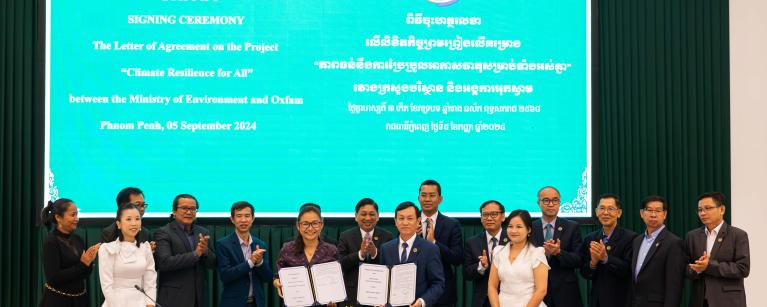Oxfam signed an agreement with the Ministry of Environment in September 2024 for the “Climate Resilience for All” project, funded by the Embassy of Ireland, the Australian Ministry of Foreign Affairs and Trade (DFAT), and the Swiss Agency for Development and Cooperation (SDC). This project aims to enhance the resilience among Cambodian people, reduce climate change risks, and promote sustainable development.
This agreement underscores the collaborative efforts of the Ministry of Environment in addressing climate challenges in Cambodia. Oxfam and our partners believe the project will drive significant change, advancing resilience and sustainable development in the region.
H.E Paris Chuob, Secretary of State of the Ministry of Environment, recognized the strong cooperation with Oxfam and noted that this agreement will help address climate change and turn risks into opportunities. Initiatives will focus on afforestation, green initiatives, waste recycling, and renewable energy adoption to promote equitable and sustainable growth at the grassroots level.
Ms. Sophoan Phean, Oxfam National Director, expressed enthusiasm for the Ministry of Environment’s commitment to enhancing collaboration on the Climate Resilience for All project. Oxfam recognizes the need for close cooperation to effectively address climate change, focusing on supporting communities dependent on natural resources, particularly women, youth, and indigenous groups in rural areas. This partnership aims to foster a sustainable and resilient future for Cambodia.
Oxfam and partners are dedicated to supporting the Royal Government of Cambodia (RGC) in balancing environmental conservation with economic development. The Natural Resources Governance (NRG) program of Oxfam aligns with Strategy 4 of the Pentagonal Strategy - Phase 1, emphasizing resilient and sustainable development practices that prioritize environmental sustainability and climate preparedness while promoting a green economy.
Oxfam has supported the Ministry of Environment and the Cambodian government in their commitment to combatting climate change and transition to a climate-resilient, low-carbon sustainable development model, including the Long-Term Strategy for Carbon Neutrality 2050 and the new circular strategy for clean, green, and sustainable development.
